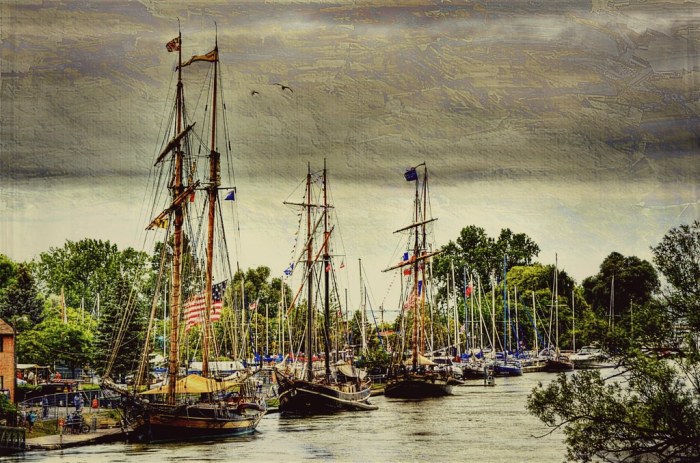Unveiling the war of 1812 port crossword clue, this exploration delves into the depths of a historical event that shaped the destinies of nations. The War of 1812, a pivotal conflict between the United States and Great Britain, left an enduring mark on the geopolitical landscape, and its echoes resonate in the crossword puzzle’s enigmatic clue.
Through a comprehensive analysis, we embark on a journey to decipher the significance of this cryptic reference.
The War of 1812 ignited over maritime disputes, territorial ambitions, and the impressment of American sailors into the British navy. As the conflict escalated, key battles and events unfolded, including the Battle of New Orleans and the burning of Washington, D.C.
These pivotal moments left an indelible imprint on the course of the war and the fate of the nations involved.
Historical Significance of the War of 1812

The War of 1812 was a defining moment in the history of the United States and Canada. It had a profound impact on the development of both nations and shaped their relationship for decades to come.
The war’s origins lay in the Napoleonic Wars, which had been raging in Europe since 1792. The United States had initially remained neutral in the conflict, but it became increasingly drawn in as Britain and France violated American shipping rights and territorial sovereignty.
The final straw came in 1812 when Britain impressed American sailors into its navy and supported Native American tribes who were attacking American settlements in the Northwest Territory.
The war was fought on land and sea, with major battles taking place in Canada, the Great Lakes, and the Atlantic Ocean. The United States initially suffered a series of defeats, but it eventually gained the upper hand and forced Britain to negotiate a peace treaty in 1814. The Treaty of Ghent restored pre-war boundaries and ended British support for Native American tribes in the Northwest Territory.
Consequences of the War
The War of 1812 had a number of important consequences for the United States and Canada.
- It boosted American nationalism and led to a renewed sense of national pride.
- It helped to establish the United States as a major power on the world stage.
- It led to the development of a more independent Canadian identity.
- It set the stage for the eventual westward expansion of the United States.
The War of 1812 was a turning point in the history of both the United States and Canada. It helped to shape the two nations into the countries they are today.
Key Battles and Events of the War of 1812

The War of 1812 was a pivotal conflict in American history, fought between the United States and Great Britain. The war was marked by a series of major battles and events that shaped its outcome.
One of the most significant battles of the war was the Battle of New Orleans, which took place on January 8, 1815. The battle was a decisive American victory, and it helped to secure the United States’ independence.
Battle of New Orleans
The Battle of New Orleans was fought between American forces led by General Andrew Jackson and British forces led by General Edward Pakenham. The battle took place on the outskirts of New Orleans, Louisiana, and it was the final major battle of the War of 1812.
The British had hoped to capture New Orleans and use it as a base for further operations against the United States. However, Jackson’s forces were well-prepared and they repelled the British attack. The British suffered heavy losses, and Pakenham was killed in the battle.
The Battle of New Orleans was a major victory for the United States. It helped to secure the country’s independence and it boosted American morale.
Burning of Washington, D.C.
Another significant event of the War of 1812 was the burning of Washington, D.C. by British forces in August 1814. The British had captured Washington without much resistance, and they proceeded to burn several public buildings, including the White House and the Capitol Building.
The burning of Washington, D.C. was a major humiliation for the United States. However, it also helped to galvanize American support for the war effort. The Americans were determined to avenge the destruction of their capital, and they fought with renewed vigor.
Naval Engagements in the War of 1812

Naval engagements during the War of 1812 played a pivotal role in the conflict, showcasing the strengths and weaknesses of both the British and American navies.
The British Royal Navy, with its vast experience and formidable size, held a significant advantage over the fledgling United States Navy. The British possessed a larger number of warships, including powerful ships of the line and frigates. They also had a well-trained and experienced officer corps.
In contrast, the American Navy was smaller and less experienced. However, American ships were generally faster and more maneuverable than their British counterparts. American naval officers were also known for their innovative tactics and aggressive spirit.
The Importance of the Battle of Lake Erie
One of the most significant naval battles of the War of 1812 was the Battle of Lake Erie, which took place on September 10, 1813. In this battle, a squadron of American ships under the command of Commodore Oliver Hazard Perry defeated a British squadron led by Captain Robert Heriot Barclay.
The American victory at Lake Erie was a major turning point in the war. It gave the Americans control of the Great Lakes, which allowed them to supply their troops in the Northwest Territory and to launch attacks on British positions in Canada.
The Role of Privateers in the War of 1812
In addition to the regular navies, both sides also employed privateers, which were privately owned ships that were authorized to attack enemy vessels. Privateers played a significant role in the War of 1812, particularly for the Americans.
American privateers captured over 1,300 British merchant ships during the war, causing significant economic damage to the British. Some of the most successful American privateers included the Comet, the Essex, and the Constitution.
Diplomatic and Political Aspects of the War of 1812

The War of 1812 was a conflict between the United States and Great Britain that lasted from 1812 to 1815. The war had a number of diplomatic and political implications, including the Treaty of Ghent, the role of Native American tribes, and the impact on Anglo-American relations.
Treaty of Ghent
The Treaty of Ghent was signed on December 24, 1814, and ended the War of 1812. The treaty restored peace between the United States and Great Britain, and it also established a boundary between the two countries. The treaty was a major diplomatic achievement for the United States, as it helped to secure the country’s independence and territorial integrity.
Role of Native American Tribes, War of 1812 port crossword clue
Native American tribes played a significant role in the War of 1812. Many tribes allied themselves with the British, while others allied themselves with the Americans. The tribes that allied themselves with the British were motivated by a number of factors, including a desire to protect their land and a belief that the British would be more likely to respect their sovereignty.
The tribes that allied themselves with the Americans were motivated by a desire to gain land and a belief that the Americans would be more likely to help them achieve their goals.
Impact on Anglo-American Relations
The War of 1812 had a significant impact on Anglo-American relations. The war led to a period of increased tension between the two countries, and it also led to a decline in trade between the two countries. The war also led to the development of a new American nationalism, and it helped to shape the country’s foreign policy for decades to come.
Legacy and Impact of the War of 1812

The War of 1812 had a profound impact on both the United States and Canada. It shaped the development of American nationalism, contributed to the formation of a Canadian identity, and had long-term effects on the relationship between the two countries.
American Nationalism
The War of 1812 helped to foster a sense of national unity and pride among Americans. The successful defense of the country against a foreign invasion boosted morale and gave Americans a new sense of confidence. The war also led to the creation of new national symbols, such as the Star-Spangled Banner, which became a symbol of American patriotism.
Canadian Identity
The War of 1812 also played a role in the development of a Canadian identity. The war helped to unite Canadians from different backgrounds and regions against a common enemy. It also led to the creation of new Canadian institutions, such as the Canadian militia, which helped to lay the foundation for the country’s future independence.
Long-Term Effects
The War of 1812 had a number of long-term effects on the relationship between the United States and Canada. The war led to the establishment of a permanent border between the two countries and helped to resolve outstanding territorial disputes.
It also led to the development of a more cooperative relationship between the two countries, which has continued to the present day.
General Inquiries: War Of 1812 Port Crossword Clue
What was the primary cause of the War of 1812?
Maritime disputes, territorial ambitions, and the impressment of American sailors into the British navy.
Which battle marked a turning point in the War of 1812?
The Battle of New Orleans, where American forces under Andrew Jackson decisively defeated the British.
What was the significance of the burning of Washington, D.C.?
It was a psychological blow to the United States and a demonstration of British military might.